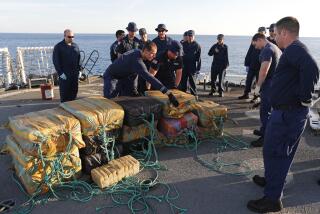Doubts Aside, U.S. Set to Boost Colombia Aid
BOGOTA, Colombia — Despite growing bipartisan concern over alleged corruption in the Colombian army, the U.S. Congress appears likely to approve increased funds for this country’s war on drugs.
A final vote on Plan Colombia funding -- the largest U.S. foreign aid program outside the Middle East and Afghanistan -- probably won’t take place until after the November congressional elections. But staffers and analysts in Washington say Colombia will receive more than $750 million, exceeding the $728 million for the current fiscal year.
Separate House and Senate versions to fund Plan Colombia each call for at least that much to be granted to the government of President Alvaro Uribe, the United States’ staunchest ally in South America.
But even Republican stalwarts such as Rep. Henry J. Hyde of Illinois, chairman of the International Relations Committee, are voicing concern over allegations of corruption in the Colombian army, an institution the U.S. has spent billions of dollars to train and expand.
This month, the Colombian Defense Ministry said it was investigating media reports that army officers planted explosives in Bogota, the capital, in the days leading up to Uribe’s second inauguration in August, in an apparent scheme to collect rewards for discovering the bombs.
The alleged plot, which reportedly involved explosives supplied by a former member of Colombia’s largest rebel group, is still under investigation. Uribe went on national television recently to deny the story, saying there was no evidence linking the officers to the bombs.
In August, army units in the Caribbean port of Barranquilla killed six people, an incident at first portrayed as accidental deaths during a kidnapping rescue attempt, then as drug-gang killings. Eight army officers and soldiers have been arrested on suspicion of murder in the case.
But the most disturbing incident for some U.S. legislators happened in May, when Colombian army troops killed 10 U.S.- trained anti-narcotics police officers and an informant in the village of Jamundi, near Cali in the west of the country.
The shootout was first described as a case of mistaken identity. But one high-ranking Uribe official has since then called it “a criminal act” in which the army units allegedly did the bidding of narco-traffickers. Fifteen army officers and soldiers are being held while a civil judge investigates the case.
Concerned about a possible whitewash of the episode, Hyde wrote a letter to Uribe this summer requesting “assurances that the Jamundi case will conclude with the exposure of the full truth and all of the facts wherever they may lead.”
A senior staffer on Hyde’s committee said Thursday: “Everyone wants to see justice done and not have this swept under the rug. This was one of Colombia’s best-trained units that worked side by side with the U.S.”
Tim Rieser, an aide to Sen. Patrick J. Leahy (D-Vt.), said the incidents raised unsettling questions about U.S. aid and oversight. “The Jamundi case and other cases in which civilians have been targeted and killed by the Colombian army illustrates that six years into Plan Colombia and after more than $1 billion in U.S. aid to the armed forces, it remains a flawed institution whose officers are rarely accountable under the law.”
Plan Colombia also faced scrutiny this year after a United Nations survey showed that five years of effort and $4.7 billion had not put much of a dent in overall coca-leaf cultivation.
Nonetheless, it appears unlikely that Plan Colombia aid will be suspended or cut, said Adam Isaacson of the Center for International Policy, a Washington-based think tank that has been critical of the aid program.
“It shows the Colombian government has managed to do an excellent job of lobbying,” Isaacson said. “Uribe knows he is one of the only friends the U.S. has in Latin America, and he is taking advantage of it.”
Several Colombian analysts say that, scandals aside, the security forces need an overhaul. They say the 35% growth in army and national police units since Plan Colombia began in 2000 has put too much strain on the institutions’ command structures and oversight mechanisms.
“The repeated incidents leave little credibility to the notion that these are isolated events,” said Alejo Vargas, a political scientist at the National University of Colombia. “The problems are profound and indicate management is inadequate.”
More to Read
Sign up for Essential California
The most important California stories and recommendations in your inbox every morning.
You may occasionally receive promotional content from the Los Angeles Times.










